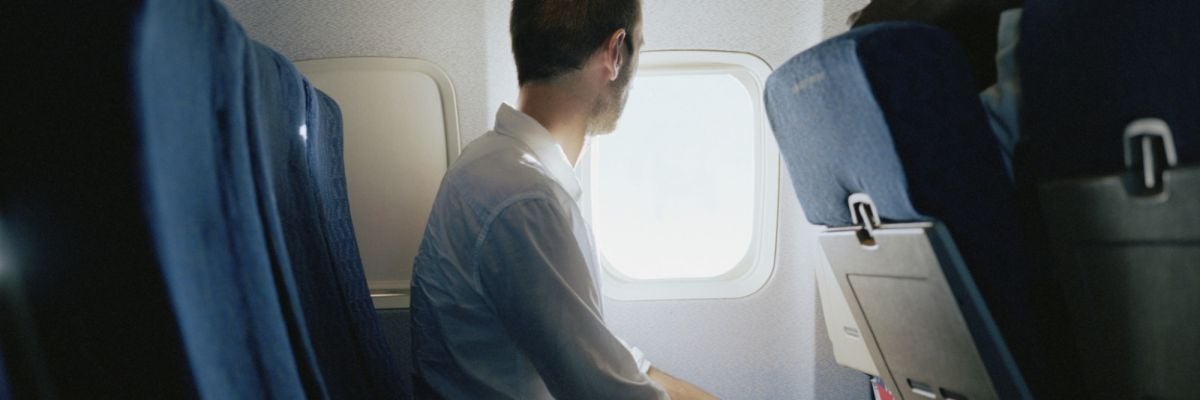
I have a plane trip coming up, and with it, my standard pre-flight anxiety.
It’s not fear of flying (I don’t love hurtling through low orbit, separated from death by a few inches of aluminum and plexiglass, but I tolerate it)—it’s fear that God may put someone in the next seat for me to evangelize.
Some people—extroverts, probably—relish the opportunity to witness, but not me. I’m just no good at it. Give me a theological point to argue, an enemy of the Faith to fight, and I’m your man. But I can’t seem to work up the gumption to lean over to a stranger and say, “Hello there. Can I tell you about Jesus?”
Nor am I particularly good at explaining the very basics of what I believe and why. I remember once in high school getting into a lunchroom argument with the school atheist. He wore Slayer t-shirts and mosh-pit bruises, and would later be elected senior class president—an embarrassment that the student council soon rectified by impeaching him on technical grounds. (They couldn’t do anything, though, when the same voting bloc picked Wish You Were Here as our prom song.)
“How do you know God exists?” he asked with an edge to his voice.
From my mouth squeaked out the feeblest of replies: “Because he does.” Honestly, that was the best I could do.
I won’t be too hard on my ignorant teenage self, though. Fact is, many of us are more effective apologists and evangelists when we have something to work with. Cold-calling souls or giving a basic witness can be a much harder task than, say, responding to a direct attack on the Eucharist. As Chesterton put it, “There is about all complete conviction a kind of huge hopelessness. The belief is so big that it takes a long time to get it into action.”
So I’ve been thinking about what I’d say if, while several miles above the earth, someone were to see me crossing myself before eating a bag of peanuts and ask, in all sincerity, Why do you believe it? Ground-up, blank-slate answer: Go.
The answer has to begin with God. It’s an article of faith that we can’t have faith unless God first calls us and then gives us the grace to believe. All the apologetical cleverness in the world is no substitute for this grace.
I believe, then, because God gives me the ability to believe. But what are my human reasons for cooperating with this power, for persisting in belief? I can think of three.
1. My mind says it’s reasonable
My colleague Trent Horn has the market cornered on pro-theism arguments and I don’t mean to list them all here. For our purposes the point is that such arguments are there for us to access, and they’re compelling. The existence of God—a loving, powerful, perfect God—jibes with reason. I see with my mind that our universal perceptions demand an uncaused cause and unmoved mover, that a moral law demands a moral lawgiver, that order in the universe requires a principle of order, and so on. Likewise I can test atheist arguments against the standard of reason, and having done so I reject them.
If my mind tells me God exists and some things about what he’s like, then I can set to the question of whether this God ever made himself known in history, and if so, whether we can reliably find out about it. I will tell my airplane seat-mate that this thought process leads me logically, if not quite infallibly, to assent to the truth-claims of Christianity and specifically Catholicism.
2. My heart says it’s real
The next thing I will tell him is that my belief isn’t just a textbook conclusion; it has been confirmed through experience. I believe because my life has God’s handprints all over it.
I have felt God’s power in my soul. I have heard him speaking his word to me. I have experienced his love and forgiveness. I have seen his providence at work—marveled at the wisdom of his plans when I had thought I wanted something else, or when I had seemed to be suffering without reason.
Of course, if God’s existence were not reasonable then our experience of the divine could be just a common human delusion. Prayer could be the one-way road that atheists say it is. On the other hand, though, mere intellectual assent without personal experience would be unsatisfying. We profess to believe in this all-loving and omnipresent divine person who desires communion with us—why would he ignore us?
In my life, I’ll say to my new friend, and in the lives of countless believers, God lives and works and loves just as we have reason to expect he would. This validates and strengthens my belief.
3. My will says there’s no other way
The third and final reason is the trickiest one. I believe because I must believe, because there’s no alternative that makes life worth living.
Blaise Pascal, in his famous “wager,” said that the choice to believe makes the most sense. If it turns out to be the wrong choice, we will have ventured little and gained nothing (or perhaps gained a little earthly peace, however falsely premised). If it turns out to be the right choice, we will have gained everything.
So I choose to believe, not in response to evidence presented to my head or my heart, but as an act of the will. Why gamble with what might be an eternal destiny? If it turns out there’s no God, what good was being correct in your agnostic pride when you wind up as worm food?
Taking the wager a step further, I also choose to believe because any other choice leads only to despair. Even for the luckiest of us, good times are fleeting. Pain outweighs pleasure. Every earthly delight is temporary and inconstant. If we’re honest with ourselves we realize that it’s not enough, as Woody Allen once mused, to be “part of the experience.” In our deepest being we crave permanence: of youth, strength, beauty, love, happiness. At the same time we see clearly that the universe can’t give it to us.
That leaves three options that I can figure. We can commit suicide; we can strive to acquire as much pleasure as we can and try not to think about how none of it matters; or we can choose to believe that a fulfillment of our permanence-craving actually exists—and devote our lives to finding it.
Even if there were no evidence for my head or heart, fellow passenger, I’d be compelled from within to choose meaning over absurdity. Now, would you mind terribly if I told you a little about Jesus?



